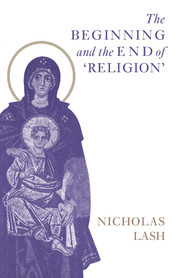Book contents
- Frontmatter
- Contents
- Preface
- PART ONE A MEETING-PLACE FOR TRUTH
- PART TWO EMERGING FROM MODERNITY
- 4 Observation, revelation and the posterity of Noah
- 5 On what kinds of things there are
- 6 Contemplation, metaphor and real knowledge
- 7 When did the theologians lose interest in theology?
- 8 Anselm seeking
- 9 Creation, courtesy and contemplation
- 10 Hollow centres and holy places
- 11 Hoping against hope, or Abraham's dilemma
- 12 Eagles and sheep: Christianity and the public order beyond modernity
- 13 Incarnation and determinate freedom
- 14 Beyond the end of history?
- List of works cited
- Index
5 - On what kinds of things there are
Published online by Cambridge University Press: 05 March 2012
- Frontmatter
- Contents
- Preface
- PART ONE A MEETING-PLACE FOR TRUTH
- PART TWO EMERGING FROM MODERNITY
- 4 Observation, revelation and the posterity of Noah
- 5 On what kinds of things there are
- 6 Contemplation, metaphor and real knowledge
- 7 When did the theologians lose interest in theology?
- 8 Anselm seeking
- 9 Creation, courtesy and contemplation
- 10 Hollow centres and holy places
- 11 Hoping against hope, or Abraham's dilemma
- 12 Eagles and sheep: Christianity and the public order beyond modernity
- 13 Incarnation and determinate freedom
- 14 Beyond the end of history?
- List of works cited
- Index
Summary
Religion, like art and music, is, in our culture, allowed to be about the Beautiful; sometimes it is even allowed to be about the Good. What is excluded, by the dominant ideology, is any suggestion that the business of religion, no less than that of science, is Truth. My understanding is that Alister Hardy, in whose memory we meet, devoted his life to contesting this exclusion. He did so, moreover, not by struggling against the methods and conclusions of the natural sciences, but (in David Hay's description) by ‘attempting to bring about a reconciliation’ between ‘evolutionary theory and the spiritual awareness of humanity’ that would ‘satisfy the intellectual world’.
Because that project seems to me as admirable as it is ambitious, I regard it as a great honour to have been invited to lecture in Alister Hardy's memory. And because I judge the strategy which he deployed in furtherance of his project to have been as philosophically muddled as it was theologically wrong-headed, we should have an interesting afternoon!
Before proceeding any further, I do want to emphasise not only that my endorsement, in principle, of Hardy's project is quite sincere, and by no means merely a gesture of ritual civility, but also that I find myself in close agreement with David Hay when he stresses the importance of teaching children some sense of stillness, attentiveness, or reverence, and of the need to develop in them ‘an understanding of the role of language and metaphor in focusing and interpreting our experience of life’.
- Type
- Chapter
- Information
- The Beginning and the End of 'Religion' , pp. 93 - 111Publisher: Cambridge University PressPrint publication year: 1996



